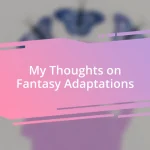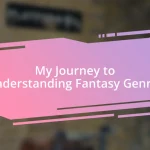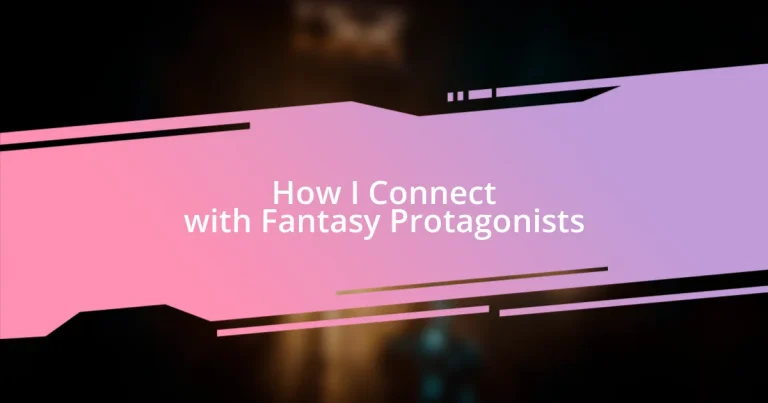Key takeaways:
- Fantasy protagonists often reflect our own struggles, insecurities, and growth, making them deeply relatable.
- Key character traits such as vulnerability, growth, and moral dilemmas resonate with our personal experiences and inspire empathy.
- Lessons learned from protagonists can lead to personal growth, encouraging us to confront challenges and embrace our vulnerabilities.
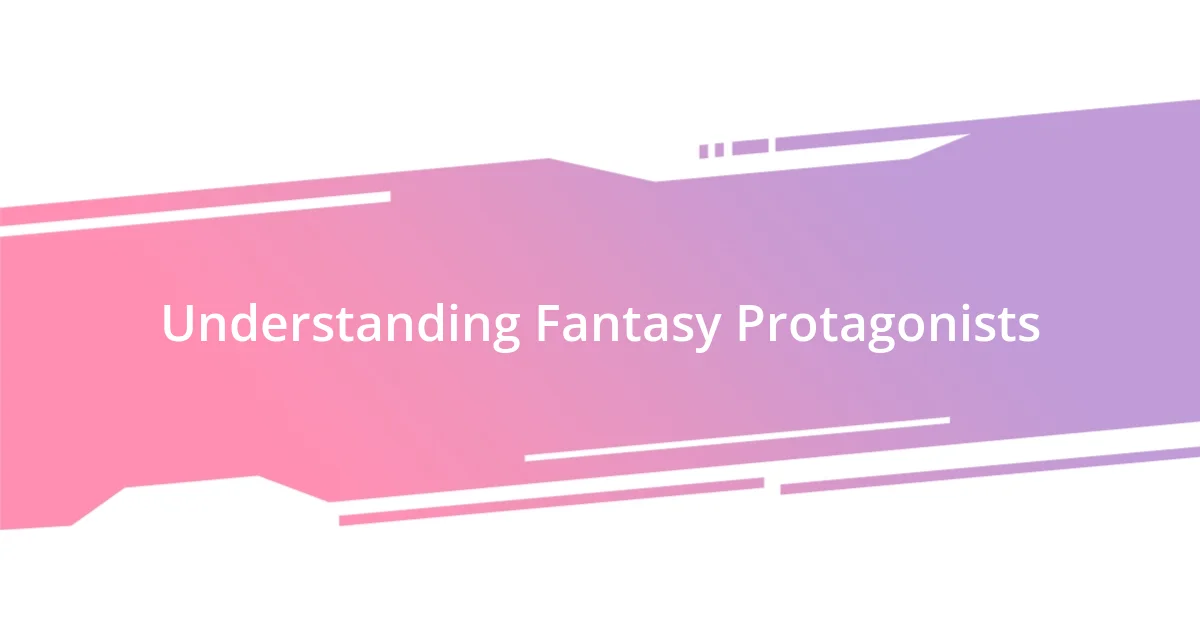
Understanding Fantasy Protagonists
When I think about fantasy protagonists, I often realize how their journeys mirror the struggles we face in our daily lives. Take, for instance, the classic trope of the reluctant hero. Isn’t it fascinating how these characters grapple with self-doubt yet rise to the occasion? I remember feeling a similar push-pull when I tackled a challenging project at work—wondering if I had what it took to succeed while knowing that I couldn’t let my team down.
What really resonates with me is the depth of their inner conflicts. The protagonists I connect with often deal with loss, identity crises, or a yearning for belonging. I vividly recall my emotional connection with a character who lost everything yet found strength through their friendships. Have you ever felt that tug when a character’s pain becomes almost palpable? It’s those moments that can make a story come alive and swirl around in your mind, long after you’ve turned the last page.
Understanding fantasy protagonists means acknowledging their complexity, which is what makes them relatable. For instance, I’ve found that their motivations are often rooted in profound experiences—maybe a betrayal or a heartbreaking decision. Isn’t it incredible how these experiences shape their paths? It makes me ponder how our own backgrounds influence who we are and the choices we make.
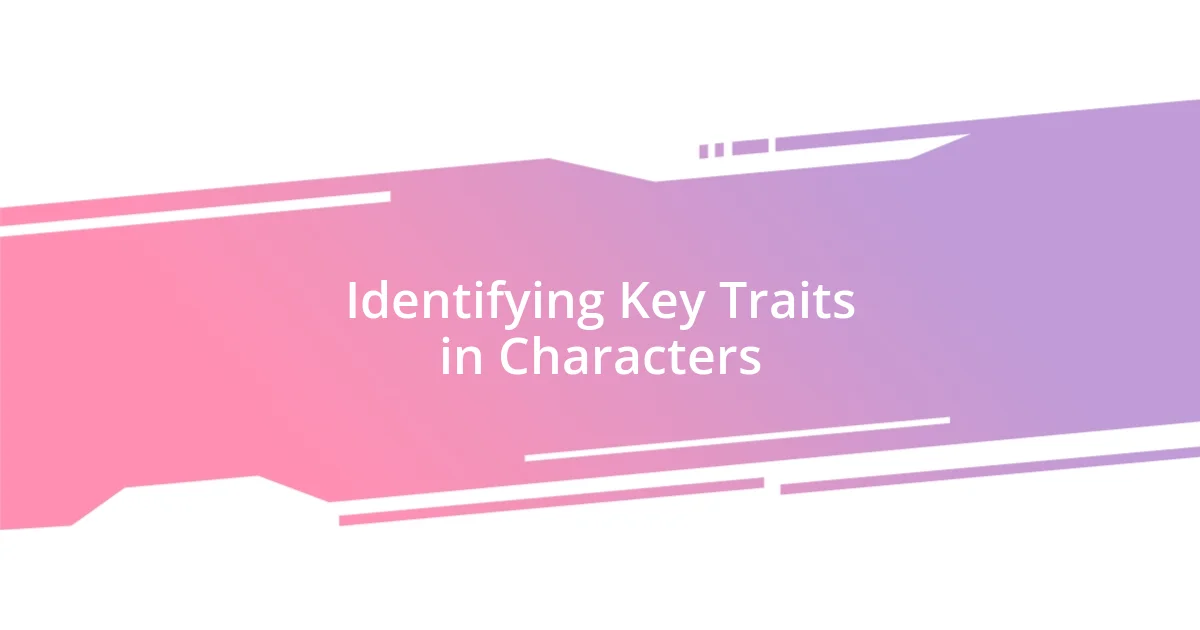
Identifying Key Traits in Characters
Identifying key traits in characters is essential for connecting with their journeys. For me, the most striking attributes are often found in their vulnerabilities. When I encountered a protagonist who was fiercely protective yet deeply afraid of losing those they loved, it reminded me of my own fears during times of uncertainty in my relationships. These traits resonate because they reveal our shared human experiences; they’re not just fictional quirks but mirror the complexities we all navigate.
Another aspect I pay close attention to is their growth over time. Characters who start off as naive but evolve into courageous leaders always capture my interest. I think back to one specific character whose journey from cowardice to heroism inspired me during my own moments of self-discovery and bravery. It’s intriguing how their challenges often echo our own paths, demonstrating that growth is a universal theme.
Lastly, I find that moral dilemmas can define a character profoundly. When a protagonist faces a choice that tests their integrity, it often weighs heavily on me, too. There’s a particular moment in a story where a character must choose between loyalty and justice, and I remember feeling the same tug-of-war when I had to stand up for what I believed in, even when it meant risking my friendships. These traits, rooted deeply in real emotions, are what draw me closer to the characters and their stories.
| Key Trait | Emotional Insight |
|---|---|
| Vulnerability | Reflects our shared fears and struggles. |
| Growth | Inspires personal self-discovery and bravery. |
| Moral Dilemma | Tests personal beliefs and integrity, creating conflict. |
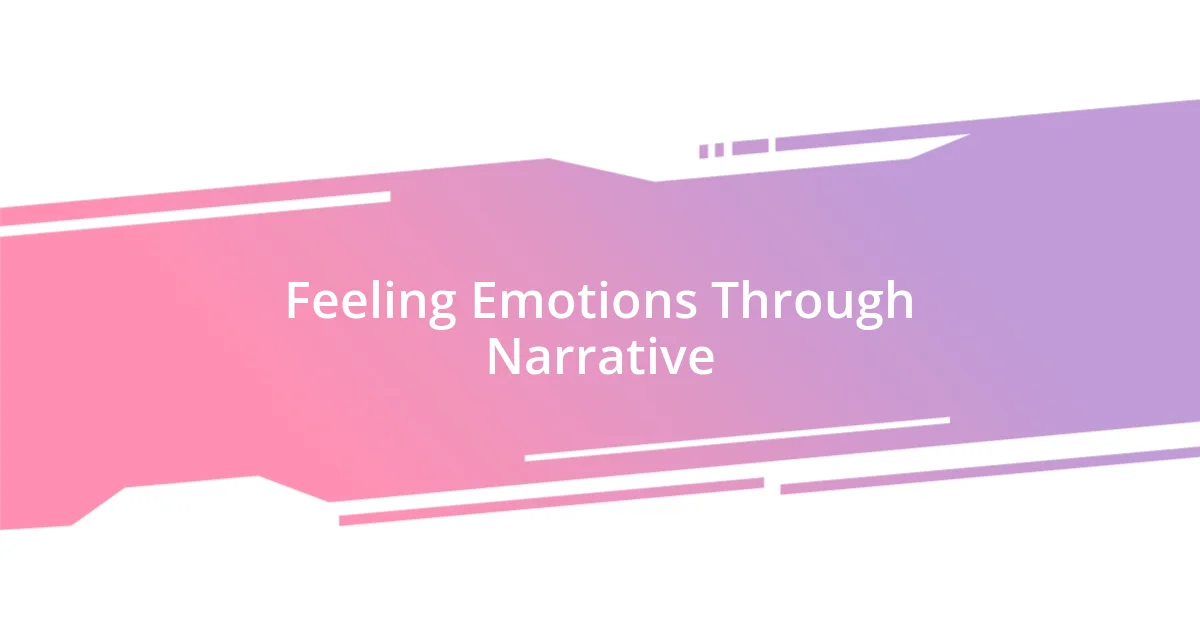
Feeling Emotions Through Narrative
When I delve into a narrative, it’s the emotions that pull me in the most. There’s something powerful about experiencing a character’s anguish or joy. I remember reading a scene where a protagonist faced a loss so profound that I couldn’t help but reflect on my own experiences of grief. It’s almost like I was reliving those moments through them, feeling each heartbreak as if it were mine. Each emotional beat serves as a connection point, allowing me to feel what they feel, often leading to deep, resonant realizations about my own life.
Our ability to feel emotions through narrative can often boil down to a few key factors:
- Relatability: Characters who mirror my experiences make their emotions more accessible.
- Descriptive Language: Vivid imagery creates a sense of immediacy, pulling me into their world.
- Universal Themes: Themes like love, loss, and identity transcend genres, making their experiences feel like ours.
These aspects draw me deeper into the story, reminding me that while I may not live in a fantasy realm, the emotions and struggles of these characters echo in my own life.
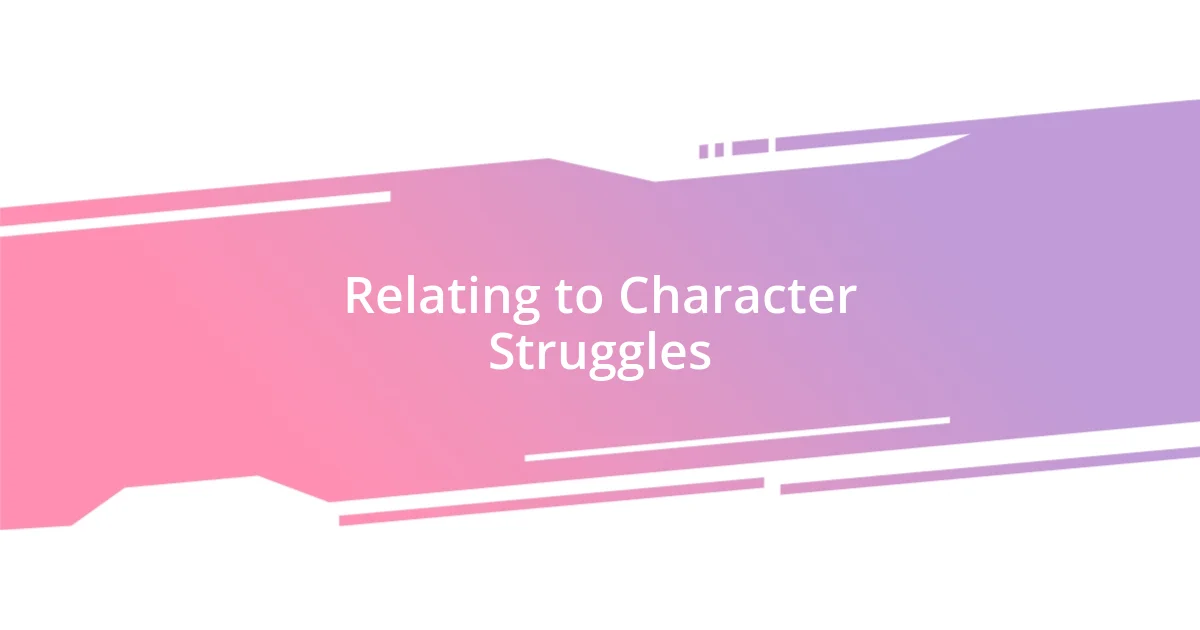
Relating to Character Struggles
Relating to a character’s struggles often feels like looking in a mirror. There was a fantasy novel I read where the hero grappled with feelings of inadequacy, constantly questioning their worth. I couldn’t help but reflect on my own moments of self-doubt, especially during challenging times at work; it was as if their journey articulated the unspoken battles I face. Those shared experiences create a bridge between my reality and their fictional world.
I’ve noticed that characters who endure setbacks evoke a certain empathy within me. When a protagonist faced repeated failures, it reminded me of my own struggles while training for marathons—each stumble making the finish line feel farther away. Yet, just as I learned to embrace those failures as stepping stones rather than roadblocks, so too did that character find resilience within their hardship. Isn’t it fascinating how these trials resonate with our own resilience?
The moral complexities characters encounter can be particularly poignant. There’s something deeply relatable about a character caught between personal ambition and loyalty to friends. I remember feeling a similar conflict during a group project where my ideas clashed with those of my teammates. Watching that character fight for what they believed in, despite the potential fallout, made me reevaluate my own decisions. It’s moments like these that remind me how interconnected our struggles are—both in life and in fiction.
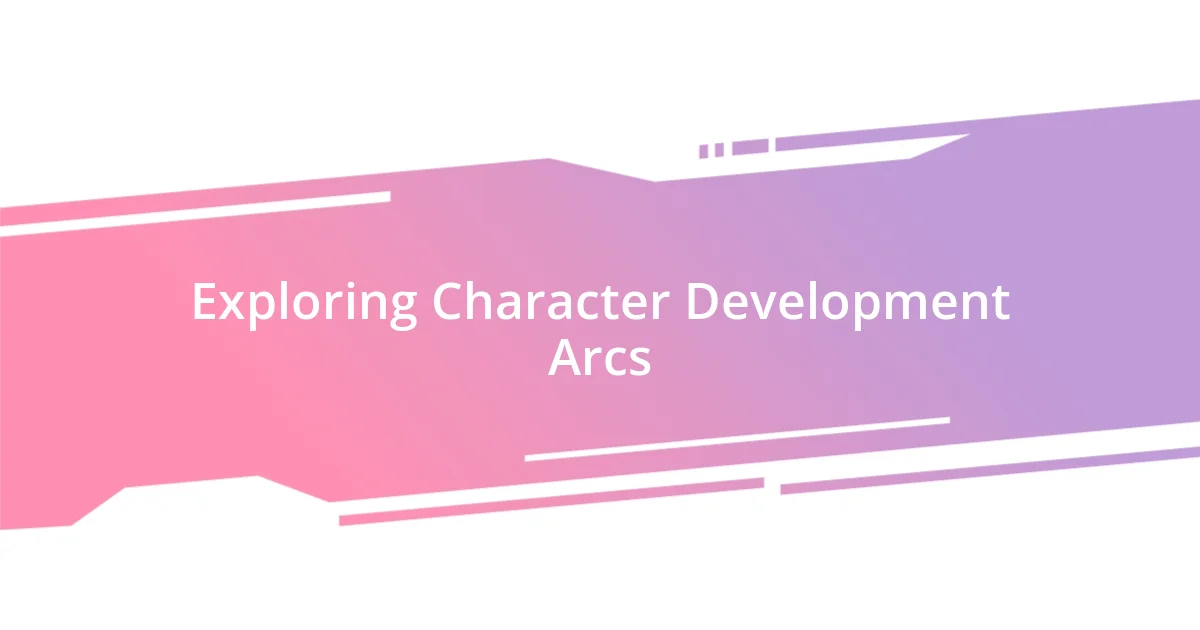
Exploring Character Development Arcs
Character development arcs are fascinating to explore because they often mirror our own journeys of growth. When I reflect on a protagonist’s transformation, it evokes a visceral sense of empathy. For instance, I vividly recall a series where a seemingly ordinary character evolved into a powerful leader. Watching their gradual realization of inner strength reminded me of my own path from uncertainty to confidence during the early days of my career. How can we not feel connected to their journey when it reflects our own evolution?
The ups and downs of a character’s arc can lead to significant emotional insights. I once read about a character who grappled with forgiveness after a devastating betrayal. Their struggles took me back to a time when I had to decide whether to restore a friendship that had deeply hurt me. It made me ponder: how do we navigate the complex web of loyalty and healing? When characters face these pivotal moments, it often illuminates my own choices, allowing me to approach my relationships with a fresh perspective.
Seeing characters evolve through challenges enhances my understanding of resilience. There was a fantasy protagonist who faced failure after failure, yet each setback unveiled a new layer of their character. It struck a chord with me, reminiscent of my own experiences while learning to play the guitar. I remember the frustration when my fingers wouldn’t cooperate, yet every awkward strum taught me patience and determination. Don’t you think it’s remarkable how our failures can shape us just as much as our triumphs? That shared journey of growth between myself and these characters is precisely what makes their arcs so compelling and relatable.
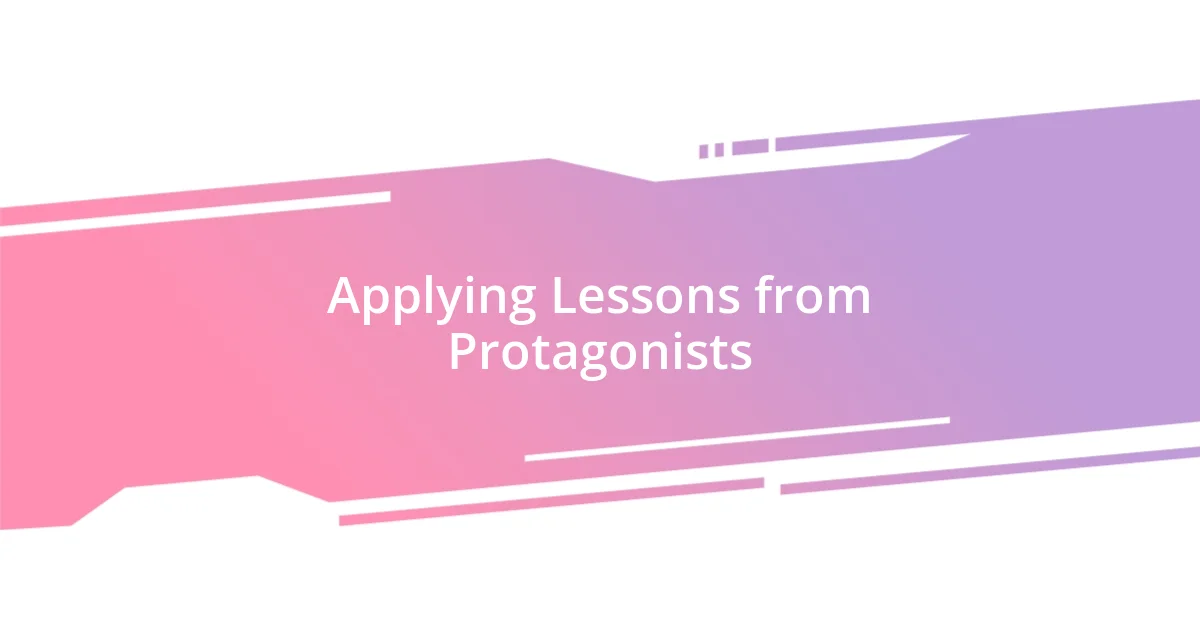
Applying Lessons from Protagonists
Applying the lessons I learn from protagonists often leads to profound insights in my own life. I remember a time when I felt overwhelmed by a major personal project, similar to a character navigating a labyrinth of doubts and fears. Their determination to push through made me question: what if I embraced that struggle instead of shying away from it? It taught me to tackle challenges with a newfound bravery.
One lesson that stands out to me is the power of vulnerability. I once read about a hero who, rather than maintaining a facade of strength, openly acknowledged their fears. This honesty struck me deeply, especially during a time when I hesitated to share my own insecurities in a group setting. How could I expect others to relate if I wasn’t willing to show my authentic self? Witnessing that character’s journey encouraged me to be more genuine, transforming how I connect with those around me.
The themes of courage and perseverance resonate strongly as well. In a gripping tale, a protagonist faced the daunting task of standing up against overwhelming odds. I couldn’t help but reflect on moments in my life where I’d shied away from confrontation out of fear. Seeing them rise in the face of adversity inspired me to act differently the next time I encountered a conflict. Isn’t it incredible how fiction can nudge us towards real-world bravery? These lessons, I find, are not just stories but blueprints for personal growth.
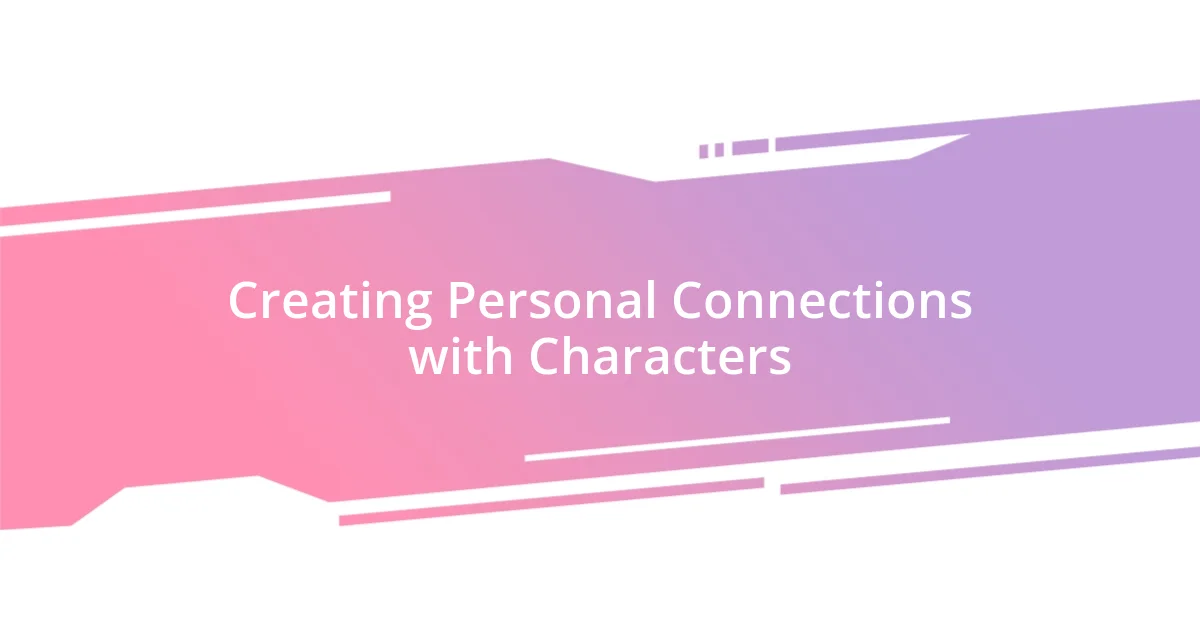
Creating Personal Connections with Characters
Creating a personal connection with characters means recognizing pieces of ourselves within them. There was a moment while reading about a protagonist battling their inner demons that I felt a jolt of recognition. It reminded me of times when I wrestled with my own doubts, particularly during my first big presentation at work. I wondered, how often do we see our insecurities reflected in fictional struggles? Those moments create an unseen bond that makes the adventure feel personal.
Characters often face dilemmas that echo our own real-life choices. I think about a novel’s hero who had to make the heart-wrenching decision to choose between duty and love. Their conflict tugged at my heartstrings, resonating deeply as I reflected on a time when I had to prioritize my career over a meaningful relationship. Didn’t we all have moments where we felt torn between two paths? Such dilemmas draw us closer to these characters, as their experiences become mirrors for our own.
I believe that moments of vulnerability in characters enhance our connections to them. For instance, when a female lead openly shared her fear of failing in front of her peers, I felt a rush of empathy. It took me back to the countless times I hesitated to pursue opportunities out of fear of judgment. How much stronger can we become when we acknowledge our fears? Watching her confront those feelings encouraged me to embrace and share my own vulnerabilities, reminding me that it’s perfectly okay to be imperfect in a world that often demands perfection.


